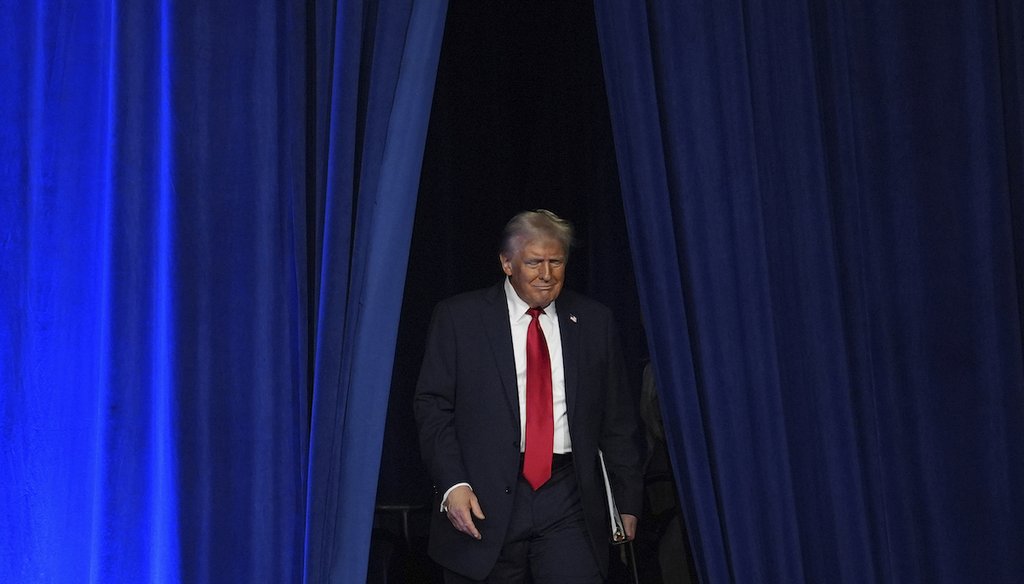Stand up for the facts!
Our only agenda is to publish the truth so you can be an informed participant in democracy.
We need your help.
I would like to contribute

Republican presidential nominee former President Donald Trump arrives at an election night watch party at the Palm Beach Convention Center, Wednesday, Nov. 6, 2024, in West Palm Beach, Fla. (AP)
If Your Time is short
-
Section 3 of the U.S. Constitution’s 14th Amendment prohibits anyone who engaged in insurrection against the U.S. from holding federal or state office.
-
The U.S. Supreme Court in March ruled that the rule’s enforcement must come through an act of Congress, at least by legal scholars’ interpretations of the ruling.
-
There’s no sign Congress will enforce Section 3 to stop President-elect Donald Trump from becoming the next president.
Former Republican President Donald Trump won back the White House on Nov. 5, after he fought his 2020 election loss with baseless claims of widespread fraud.
Some social media users have claimed efforts by Trump, now the president-elect, to overturn the 2020 election results and remain in power disqualify him from holding office again under the U.S. Constitution’s 14th Amendment.
"Reminder: Donald Trump is still possibly barred from being sworn in as President for inciting an insurrection in violation of Sect 3 of the 14th Amendment," one Threads post said.
Trump’s potential disqualification under the 14th Amendment was the subject of a Colorado lawsuit, brought by a group of voters, that led to the U.S. Supreme Court ruling in March that states lack the power to disqualify candidates from federal office under that amendment. The U.S. Supreme Court, in Trump v. Anderson, ruled Colorado could not keep Trump off the ballot, reversing a decision by the Colorado Supreme Court, but it stopped short of deciding whether Trump engaged in insurrection. The Colorado Supreme Court determined Trump engaged in insurrection.
Legal scholars who spoke with PolitiFact said the court’s ruling means that any enforcement of the 14th Amendment to keep Trump out of the White House would need to come through Congress. Because of Congress’ current political makeup (Republicans control the House) — that almost certainly won’t happen by Jan. 20, when Trump will be sworn in as the 47th president. (Unofficial 2024 election results show Republicans will have control of the Senate in the next Congress; control of the House is still undetermined because votes are still being counted.)
Sign up for PolitiFact texts
Section 3 of the 14th Amendment, passed in the Civil War’s aftermath, was designed to prevent former Confederate officials from holding federal office. It said that a person who previously took an oath of office and "engaged in insurrection or rebellion" against the U.S. cannot hold any office in the U.S. A two-thirds vote of Congress can remove that disqualification.
Congress invoked the section for multiple would-be officeholders after the Civil War, when it refused to seat certain members. And Congress passed the 1870 Enforcement Act to enforce the provision. In 1872, Congress passed the Amnesty Act, which removed the prohibition for most ex-Confederates.
A New Mexico court in 2023 disqualified a county commissioner from holding office under the section because he was convicted for engaging in the Jan. 6, 2021, uprising, one of the rare times the section has been enforced since the Reconstruction era. The U.S. Supreme Court upheld that ruling this year, reinforcing its ruling in the Colorado case that states have the authority to enforce the prohibition on state officeholders.
A key issue in the Colorado case that was eventually decided by the U.S. Supreme Court in March was whether the disqualification from office under Section 3 was "self-executing" or whether it required some determination by Congress or courts.
In laying out its opinion in that case, the court’s majority said Congress has the power to enforce Section 3 of the 14th Amendment, and states cannot enforce it for federal officeholders. The court pointed to Section 5 of the amendment, which said Congress "shall have the power to enforce, by appropriate legislation" the provisions in the amendment.
The court’s three liberal justices, along with Trump-appointed conservative Justice Amy Coney Barrett, agreed with the underlying ruling that states cannot enforce Section 3. But they wrote separate opinions arguing the majority should not have gone beyond that to dictate how else Section 3 can be enforced.
Because of that ruling, most legal scholars agree that a disqualification for Trump under the 14th Amendment would have to come explicitly from Congress.
Legal scholars said there’s no reason to suspect Congress will act to bar Trump from office because of his efforts to overturn the 2020 election.
"I think whatever the legal argument surrounding that, as a practical matter, it’s just not going to happen, because, obviously, the Republicans will be completely against it," Ilya Somin, a George Mason University law professor, said. "But I don’t see much in the way of a movement among Democrats to do it either."
The U.S. Supreme Court ruling left ambiguous whether enforcement requires specific legislation, or whether Congress could refuse to certify Trump’s election on Jan. 6, 2025, legal experts said.
Derek Muller, a University of Notre Dame law professor, said a Congress member could object to electoral votes for Trump on the grounds he engaged in insurrection, but the Electoral Count Act does not empower Congress to have a full investigation of the facts when they certify the votes. In any case, Congress’ future makeup ensures any attempts to deny Trump’s certification on those grounds will be futile.
Some scholars disagree that the court’s ruling means Congress has the exclusive authority to enforce the section. Law professors William Baude of the University of Chicago and Michael Stokes Paulsen of the University of St. Thomas, who published a 2024 paper arguing Trump was disqualified from office under Section 3 of the 14th Amendment, wrote in a forthcoming article for the Harvard Law review that they do not think the court’s ruling means Congress has the exclusive power to enforce Section 3.
Although the concurring opinion from the liberal justices signals they believe the majority gave exclusive enforcement power to Congress, Baude and Paulsen wrote, "the Court did not at any point say that legislation under Section 5 was constitutionally required in order for Section 3 to have legal force."
That is a point of debate among experts, and other legal scholars PolitiFact spoke to said they believe the court’s ruling does mean Section 3 enforcement must come through Congress.
"I think it’s pretty clear from the majority that they think only Congress is the one who can do this," Muller said.
Even after his campaign’s court cases challenging the results of the 2020 election failed and states had certified their presidential electors for President Joe Biden, Trump continued a campaign to prevent Congress from certifying Biden’s victory. His campaign assembled alternate, uncertified slates of electors, and he pressured Vice President Mike Pence to reject the electoral votes from states he claimed were rife with fraud.
After a mob of his supporters broke into the U.S. Capitol and delayed the vote certification on Jan. 6, 2021, the House of Representatives impeached Trump for "incitement of insurrection." The Senate acquitted Trump on that charge.
But no federal court has found Trump engaged in insurrection, and he has not been found guilty under the Insurrection Act or any other federal law that would disqualify him from office under Section 3 of the 14th Amendment.
"Congress has not enacted a statute in terms of liability," Muller said. "He’s not been prosecuted under the Insurrection Act, much less found guilty under the Insurrection Act, which would disqualify him. So there's no existing statutory mechanisms enacted by Congress to determine his eligibility at this time."
Trump’s most ardent Democratic critics have made clear they don’t intend to try enforcing Section 3 of the 14th Amendment to keep him from taking office, and Republicans in Congress are eager to see him return to the White House. Under the procedures the U.S. Supreme Court set out, it’s nearly certain Trump won’t be blocked from taking office.
Our Sources
Threads post, Nov. 6, 2024
Phone interview with Derek Muller, law professor at the University of Notre Dame
Phone interview with Ilya Somin, law professor at George Mason University
Congress.gov, Fourteenth Amendment, accessed Nov. 7, 2024
SCOTUSblog, Supreme Court rules states cannot remove Trump from ballot for insurrection, March 4, 2024
U.S. Supreme Court, Opinion in Trump v. Anderson, March 4, 2024
Congress.gov, Overview of the Insurrection Clause (Disqualification Clause), accessed Nov. 7, 2024
University of Minnesota Law School Constitutional Commentary, Amnesty and Section Three of the Fourteenth Amendment, 2021
Source New Mexico, U.S. Supreme Court upholds decisions barring Couy Griffin from ever holding elected office in NM, March 18, 2024
U.S. Supreme Court, Brief of Amicus Curiae NAACP Legal Defense & Education Fund, Inc., Jan. 18, 2024
Campaign Legal Center, Congress Takes Historic Action to Update the Electoral Count Act, Dec. 23, 2022
William Baude and Michael Stokes Paulsen, The Sweep and Force of Section Three, Feb. 19, 2024
William Baude and Michael Stokes Paulsen, Sweeping Section Three under the Rug: A Comment on Trump v. Anderson, Sept. 10, 2024
New York Times, A Timeline of Trump’s Attempts to Overturn the 2020 Election Results, Jan. 8, 2024
Colorado Supreme Court, Anderson v. Griswold, Dec. 19, 2023
Politico, Dems say they will certify a Trump victory — even the ones who think the 14th Amendment disqualifies him, Oct. 31, 2024




































